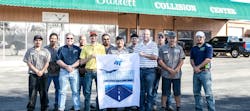The Mitchell 2016 American Road Show Heads to Texas
Two Texas shop owners explain how Mitchell Repair Center is boosting their business
At Barrett Collision Center, owner Rocky Champion takes great pride in his family’s business. It was founded by Champion’s maternal grandfather in 1962, then passed to Champion’s father before Champion took over. As a third-generation operator, he grew up on the shop floor—as did his own son, Tyler, who’s served as the business’s production manager for the past five years.
“My son Tyler,” Champion says proudly, “is the fourth generation.”
Clearly, tradition is important at Barrett Collision.
“I started working at the shop in high school when I was about 15,” Champion says. “Like most kids, I was sweeping floors, carrying trash, and then after a few years I started working in the paint department, sanding and prepping cars through high school. I worked on and off through college. I eventually worked into management, estimating and production and then I was running the shop.”
The long-running family business, which produces between 15 and 30 repair orders per week, has not gone unnoticed by customers. Barrett Collision has a pristine reputation in Abilene, a reputation rooted as much in its deep community ties as it is in the company’s forward-thinking approach to operations.
In the past year, Champion has invested roughly $400,000 in replacing and upgrading equipment to help keep Barrett Collision ahead of the industry’s ever-shifting technological curve. Before switching over to Mitchell’s RepairCenter, Barrett previously utilized the company’s ABS system. The continued upgrades in technology and dedication to progress are traits that Mitchell and Barrett have in common.
“There’s so much you can utilize with RepairCenter. It’s automated our production, our parts and our processes,” he says. “It helps with job costing. Before, it would be really hard to figure out how much a single job would cost you without spending a lot of time on your calculator. Now, I can look at things with the touch of a button as opposed to the old way.”
Champion says Mitchell RepairCenter has helped him measure and track metrics that are vital to the shop’s improvement.
“Anytime you’re aware of something, it makes you look at things a lot closer,” he explains, before offering a simple analogy: “If you know there’s a highway patrol car ahead of you on the road, you’re going to be more aware of your speed.”
The team at Mitchell has made Champion’s experience with the company a great one and he says he appreciates the personal interaction they provide. “They’re always calling to introduce new things that come out,” he says. “It always feels like they take a personal interest.”
Bruce Kaposta, owner of Collision Repair Center—the Road Show’s second Lone Star State stop—entered the collision repair industry with a mind for retail.
As he worked through various iterations of his business model (he first opened a shop with his brothers in 1980, before purchasing what would become Collision Repair Center in 1989), Kaposta found a niche serving fleets for a number of Fortune 500 companies.
“I ended up fixing cars for Sherwin-Williams, Johnson & Johnson, and more,” he says. “We are always busy. The fleet work has been our shop’s niche.”
Adding fleet to the work mix has led to significant growth: Kaposta now has two locations, which he co-runs with his girlfriend, Karla Lee, who also happens to be his high school sweetheart. Combined, the business averages about 60 repair orders per week and does about $3 million in sales annually.
Insurance work also plays a role in the success of Kaposta’s business. Collision Repair Center was the first shop in Texas to be a Mercury Insurance Shop, which is what pushed him to connect with Mitchell.
“I got Mitchell because of Mercury,” he explains. “I found that we liked it and we haven’t changed for 10 to 12 years.”
Collision Repair Center uses Mitchell Estimating (also known as UltraMate) and E-Claim Manager to send information to the insurance companies, and is looking to invest in more Mitchell products for the future.
“Mitchell works great and works quickly,” he says. “I’ve had guys that have used other systems and were hesitant to switch over. Once they become acclimated with Mitchell, they appreciate it.”
Kaposta’s shop works with trucks, so he also takes advantage of Mitchell’s TruckEst program.
“It’s just great. You can get a part number and price, and the information is saved so the next time I call about a specific part I can just re-order,” he says. “I like that program. I use it all the time.”
